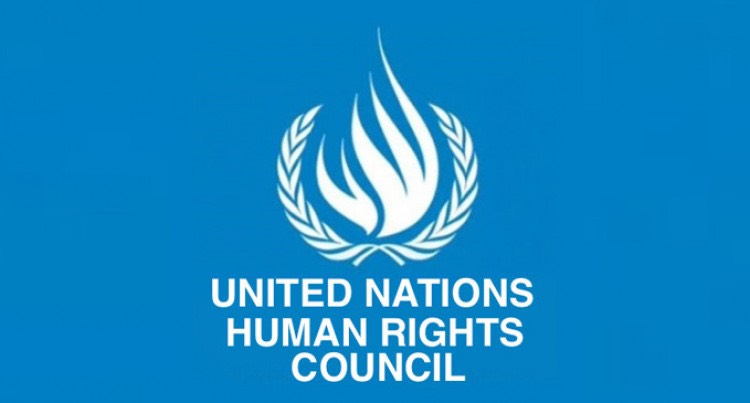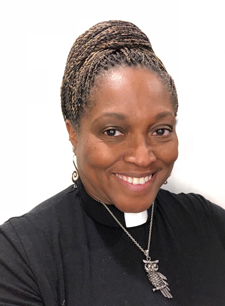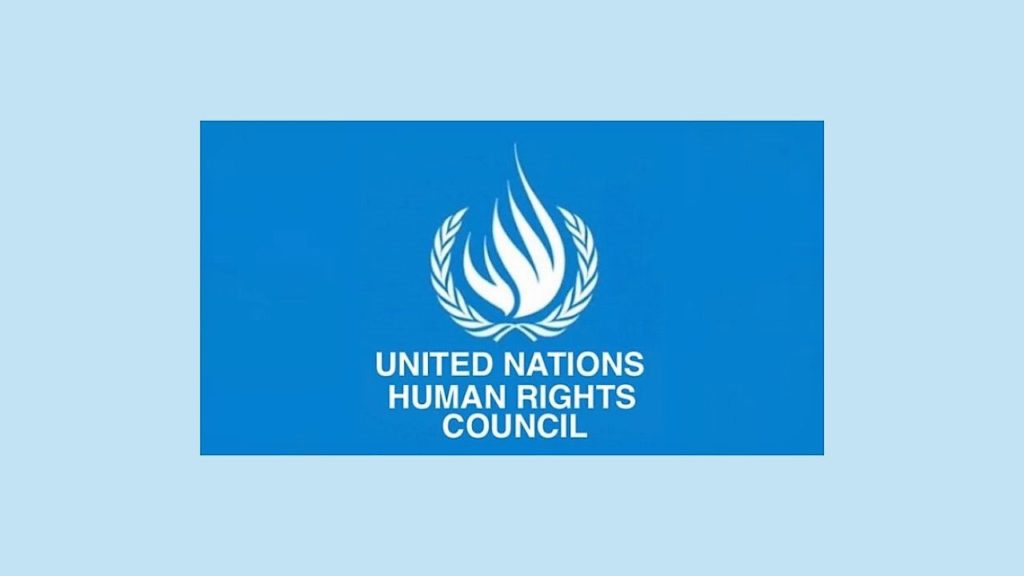North American, global Christians urge UN inquiry into ‘deadly acts of racism’
The United Church of Christ is among nine North American Christian denominations and four national and worldwide ecumenical bodies urging their members to press the United Nations for a formal inquiry into “deadly acts of racism” against black people around the world.
 Responding to an unusual “urgent debate” held by the U.N. Human Rights Council June 17-18, the religious leaders issued a June 18 statement asking UNHRC to “investigate the circumstances” of George Floyd’s death and to hold the United States and other countries accountable for “anti-black racism and racist actions.”
Responding to an unusual “urgent debate” held by the U.N. Human Rights Council June 17-18, the religious leaders issued a June 18 statement asking UNHRC to “investigate the circumstances” of George Floyd’s death and to hold the United States and other countries accountable for “anti-black racism and racist actions.”
“George Floyd’s murder points to the systemic and pervasive ways in which racism continues to inflict death and pain on black communities globally,” said a statement from the religious bodies on Thursday, June 18. Joining U.S. and Canadian churches in signing were the World Council of Churches, World Communion of Reformed Churches, Council for World Mission, KAIROS Canada and National Council of Churches (USA).
“Racism is a global problem that needs to be changed through legislation and intentional actions such as holding countries accountable for the systems that perpetuate inequality and injustice because of racism,” it said. The full text can be found here.
Seeking an official ‘commission of inquiry’
Specifically, the signatories joined calls from several countries for a formal U.N. commission of inquiry into “the ongoing human rights violations of African descendant people in the United States and globally.” Those calls were heard during UNHRC’s debate on “racially inspired human rights violations, systematic racism, police brutality against people of African descent and violence against peaceful protests.”
According to U.N. guidelines, the purpose of a commission of inquiry is “to respond to situations of serious violations of international humanitarian law and international human rights law, whether protracted or resulting from sudden events, and to promote accountability for such violations.”
The religious leaders’ statement is being sent to the U.N.’s Permanent Missions in Geneva, Switzerland, where 181 of the U.N.’s 193 member states have accredited offices – and where UNHRC is based. It asks their support in urging UNHRC to create the commission of inquiry.
The statement also urges church members and congregations to “help drive global change to combat racial injustice through the United Nations human rights mechanisms.”
‘Intervention of global community’
 The Rev. Karen Georgia Thompson (right), UCC associate general minister, took the lead in drafting and circulating the statement. “The call for urgent debate was unprecedented and points to the willingness of the global community to see a commission of inquiry established,” she said. “Anti-black racism and all forms of racism are global problems that call for the intervention of the global community to ensure human rights and dignity for all. Our hope is that the members of the Human Rights Council will address the need for strong inquiries into racism, racial violence and the killing of African descendant people in the U.S. and globally.”
The Rev. Karen Georgia Thompson (right), UCC associate general minister, took the lead in drafting and circulating the statement. “The call for urgent debate was unprecedented and points to the willingness of the global community to see a commission of inquiry established,” she said. “Anti-black racism and all forms of racism are global problems that call for the intervention of the global community to ensure human rights and dignity for all. Our hope is that the members of the Human Rights Council will address the need for strong inquiries into racism, racial violence and the killing of African descendant people in the U.S. and globally.”
In addition, the statement calls on members and congregations, in their own countries and communities, to:
- “Call for an end to the killing of African descendant people by the police and for an end to police violence.
- “Commit to dismantling racism and discrimination in all forms.
- “Embrace and encourage an anti-racist environment within communities with intention for accountability.
- “Commit to reflection and introspection that will increase personal awareness and ways to be engaged in solving this global problem.”
Denominations supporting the statement are the Anglican Church of Canada, Christian Church (Disciples of Christ), Episcopal Church, Evangelical Lutheran Church in America, Evangelical Lutheran Church in Canada, Presbyterian Church (U.S.A.), Reformed Church in America, United Church of Canada, and United Church of Christ.
U.S. urged to ‘fully cooperate’
“Anti-black racism and racist actions are violations of human rights,” the statement said. “These acts of racism against African descendant people are well documented historically and in our contemporary contexts. … As Christians believing in the love of God and the call for justice in the Judeo-Christian scriptures, we join with organizations around the world in calling for change and to the upholding of the human rights of African descendant people.”
The May 25 killing of George Floyd in Minneapolis, which has sparked global protests, was named specfically in the UNHRC debate as well as in the religious leaders’ statement. Floyd’s death has resulted in criminal charges – including one murder charge – against police officers involved.
The statement mentioned June 17 video testimony during the UNHRC debate by Floyd’s brother, Philonise Floyd, “who so movingly shared the tragic details of his brother’s last moments, conveying the trauma he and his family are experiencing following the loss of a much-loved member of their family in these circumstances. We call upon the Human Rights Council to investigate the circumstances of his death and the situation of systemic racism and related police brutality, both in the U.S. and other parts of the world, and to ensure accountability for these violations. We call upon the government of the U.S. to fully cooperate with the investigation.”
Related News
A Prophetic Call for Justice and Peace in Palestine
The executive leaders of the United Church of Christ have issued the following statement...
Read More‘Love is Greater Than Fear’: Regional Youth Events get to the heart of gospel message
United Church of Christ teens attending this summer’s Regional Youth Events (RYE) are...
Read MoreUCC desk calendars available to order now
Prepare for your day, month and year with the United Church of Christ desk calendar —...
Read More


